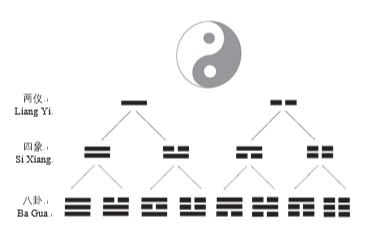Zhou Yi (Changes of Zhou)
Zhou Yi is one of the classics of pre-Qin China, composed of Yi Jing (the Book of Changes) and Yi Zhuan (the Commen- tary to the Book of Changes, also called the 'Ten Wings'). Yi Jing is composed of graphics and texts: The graphics contain 64 Gua (hexagrams) and 384 Yao (6 lines per hexagram), and the texts are called Gua Ci and Yao Ci, which are descriptions of hexagrams and lines respectively. Yi Zhuan is a collection of ten pieces, comprising seven explanations and commentaries of the Gua and Yao, and it was known as "Ten Wings" (Wing means assistance).
Zhou Yi was originally a divination manual in the Zhou Dynasty (c. 1046-256 B.C.). According to Zhou Yi, yin and yang are the basic aspects of everything in the universe. The solid line "-" stands for the yang, and the broken line "- -" stands for the yin, together they are called Liang Yi (the two modes). The two modes generate the four images, and the four images give birth to the eight trigrams. The overlapping of the two modes forms Si Xiang (the four images). Different combinations of the yang and/or yin lines (unbroken and broken lines) give rise to Ba Gua or the eight trigrams (Qian?, Kun?, Kan?, Li?, Zhen?, Gen?, Xun?, Dui?), which represent eight basic natural phenomena (Qian for sky or heaven, Kun for ground or earth, Kan for water, Li for fire, Zhen for thunder, Gen for mountain, Xun for wind, and Dui for lake or marsh). Different combinations of the eight trigrams form 64 hexagrams, which can encompass all phenomena and their changes in nature and human society.
Zhou Yi reflects the ancient Chinese understanding of the universe - the universe is in a constant state of change, and as are the essence of the universe, change alone is eternal. Zhou Yi stands for the perception and the utilization of such constant change. This recognition and understanding of changes, or rather an attempt at explaining the mysteries of everything in the universe, places Zhou Yi at the top of all ancient classics.
A philosophical masterpiece of ancient China, Zhou Yi provides a theoretical framework for all studies in natural philosophy and social practices, embodying the wisdom and spirit of the Chinese nation. Later scholars made multiple attempts to interpret Zhou Yi, giving rise to a wealth of studies on this book with a profound impact on various aspects of political, economic, and cultural life in ancient China. The philosophical thinking elucidated in this book and related interpretation attempts informs the wisdom and spirit of the Chinese nation. It encourages self-improvement and extols moral strength. These ideas continue to nourish the spirit of contemporary China.

《周易》
《周易》是中國先秦時期的傳統(tǒng)典籍,包括經(jīng)和傳兩部分。其中,《易經(jīng)》分為圖像和文字兩部分,圖像部分是64 卦和384爻,文字部分稱為卦辭、爻辭,是對卦、爻的說明。后續(xù)有解釋和闡發(fā)卦辭和爻辭的作品《易傳》,包括7種文辭共10篇,統(tǒng)稱“十翼”(“翼”為輔助之義)。
《周易》原本是周代人卜筮所用的書。《周易》認(rèn)為,宇宙萬物均由陰、陽兩個基本方面構(gòu)成,以陽爻(—)和陰爻(- -)兩種基本符號表示,稱為兩儀。兩儀生四象,四象生八卦,兩儀分別重疊,形成四象,四象再加陰陽爻,即陽爻和陰爻經(jīng)三次重疊形成八卦(見圖),八卦代表著自然界的八種現(xiàn)象。八卦相互重疊形成六十四卦,可以囊括自然界和人類社會的一切現(xiàn)象及其變化。
《周易》反映了中國古人對宇宙的認(rèn)識,即宇宙始終處于變化之中,變化是宇宙的本質(zhì),只有變化才是永恒的。《周易》實(shí)際上就是對變化的認(rèn)識和把握,被認(rèn)為蘊(yùn)含了宇宙萬事萬物的奧秘,在中國古代被譽(yù)為“群經(jīng)之首”“大道之源”。
《周易》是中國古代杰出的哲學(xué)巨著,是中國傳統(tǒng)思想文化中自然哲學(xué)與人文實(shí)踐的理論根源,是中華民族智慧和精神的結(jié)晶。《周易》經(jīng)過后世學(xué)者的不斷闡釋,形成了蔚為大觀的“易學(xué)”,對中國幾千年來政治、經(jīng)濟(jì)、文化等都產(chǎn)生了極其深刻的影響,其中蘊(yùn)含的自強(qiáng)不息、厚德載物等內(nèi)容成為滋養(yǎng)當(dāng)代中國精神的重要源泉。
